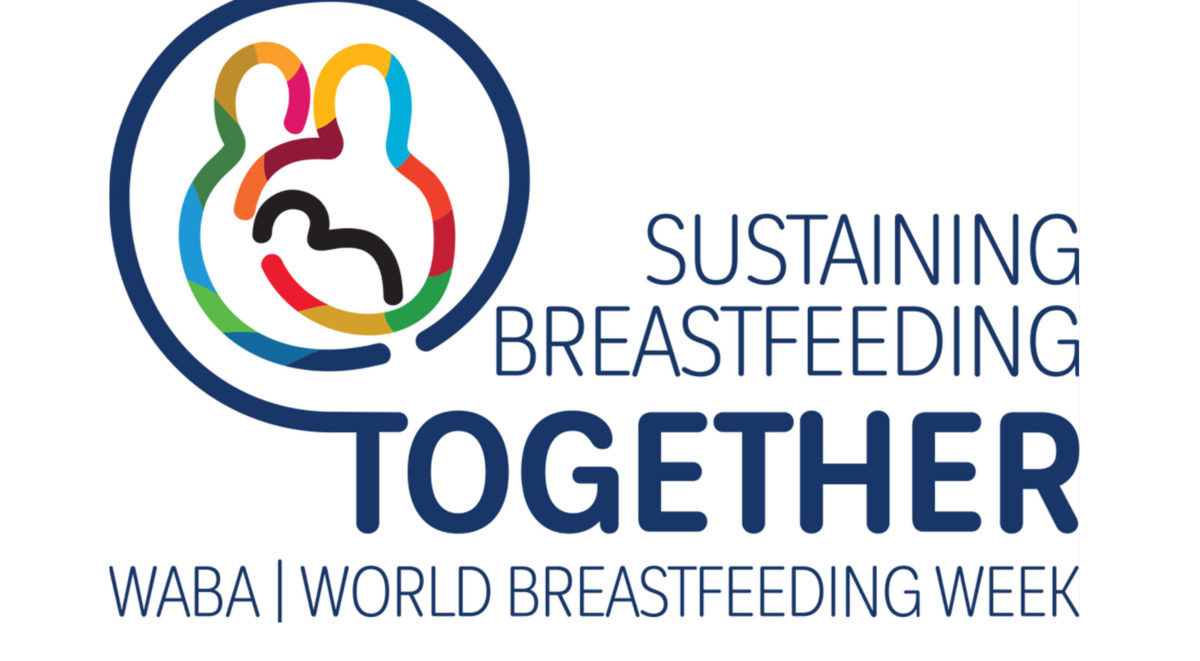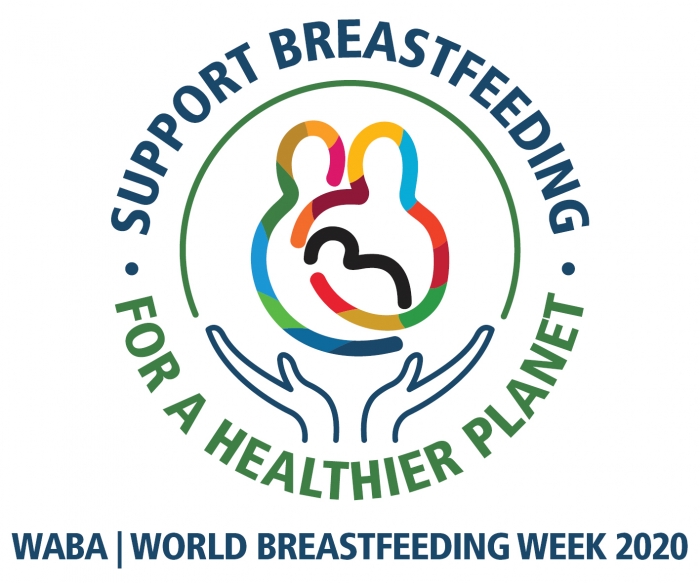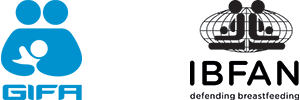
2025/01/29
WABA
Since 1992 WABA (World Alliance for Breastfeeding Action) organizes every year the World Breastfeeding Week (WBW), which is celebrated at different moments in the year, according to the country (USA and Africa, mostly first week of August; Switzerland in September; France in October…). The WBW action folder is translated in eigth languages every year and can be downloaded on WABA’s website.
Prioritise breastfeeding: create sustainable support systems (WBW 2025)
This WBW, the spotlight is back on environment and climate change. The campaign underscores the importance of prioritising breastfeeding by building robust and sustainable support systems. A supportive environment for breastfeeding not only benefits families but also significantly reduces the environmental impact associated with artificial feeding. WBW2025 aims to connect actors across all levels involved in breastfeeding support to create resilient and sustainable support systems. We will also highlight the World Health Assembly (WHA) 2025 Nutrition Targets.
Closing the Gap (WBW 2024)
WABA annonces the theme of the 2024 World Breastfeeding Week. Closing the gap : breastfeeding support for all. https://worldbreastfeedingweek.org
Programme in Switzerland
- Programme WBW 2024 Geneva University Hospitals (information boot, workshops for parents, breastfeeding consultation) for details see here https://www.hug.ch/smam-2024 GIFA will be present on the paediatric stand, come and talk to us.
- Programme WBW 2024 in Switzerland, see here Fondation Promotion allaitement maternel suisse
- WABA Action Folder 2024
For more information, check our newspost here https://www.gifa.org/en/wbw-2024/
Enabling breastfeeding – making a difference for working parents (2023)
#WBW2023 will focus on breastfeeding and employment/work. It will showcase the impact of paid leave, workplace support and emerging parenting norms on breastfeeding through the lens of parents themselves. Target audiences including governments, policymakers, workplaces, communities and parents will be engaged to play their critical roles in empowering families and sustaining breastfeeding-friendly environments in the post-pandemic work life. The theme is aligned with thematic area 4 of the WBW-SDG 2030 campaign.
Have a look at our Newspost : WBW 2023 in Geneva and activities at HUG University Hospital Geneva
Step up for breastfeeding – educate and support (2022)
#WBW2022 will focus on strengthening the capacity of actors that have to protect, promote and support breastfeeding across different levels of society. These actors make up the warm chain of support for breastfeeding. Target audiences including governments, health systems, workplaces and communities will be informed, educated and empowered to strengthen their capacity to provide and sustain breastfeeding-friendly environments for families in the post pandemic world.
Protect breastfeeding – a shared responsibility (2021)
https://worldbreastfeedingweek.org/2021/ #WBW2021 will focus on how breastfeeding contributes to the survival, health and wellbeing of all, and the imperative to protect breastfeeding worldwide. The theme is aligned with thematic area 2 of the WBW-SDG 2030 campaign which highlights the links between breastfeeding and survival, health and wellbeing of women, children and nations.
Support breastfeeding for a healthier planet (2020)

See our Greenfeeding page. Bibliography and documents for the SMAM Conference at CHUV, Wednesday 16 Sept 2020 below. Breastfeeding contributes to the prevention of global warming, protects biodiversity and conserves natural resources. Green Feeding includes community support for exclusive breastfeeding for 6 months and the addition of appropriate complementary foods for older babies.
Bibliography and References
- Formula for Disaster Weighing the impact of formula feeding vs. breastfeeding on environment (Linnecar, Dadhich et al, IBFAN-Asia/BPNI 2014)
- Report on Carbon Footprints Due to Milk Formula: A Study from Selected Countries of the Asia-Pacific Region. Dadhich JP, Smith J, Iellamo A, et al.BPNI/IBFAN Asia. 2015 https://ibfanasia.org/docs/Carbon-Footprints-Due-to-Milk-Formula.pdf
- Why invest? – The environmental costs of not breastfeeding (Rollins et al, Lancet 2016)
- UN Climate Action Summit (2019): Green Feeding – healthy, local and sustainable foods from birth, van Esterik, Linnecar et al, IBFAN-GIFA-WBTi)
- Support for breastfeeding is an environmental imperative – Formula milk contributes to environmental degradation and climate change (Joffe et al, BMJ 2019)
- The cost of not breastfeeding , Walters et al, Health Policy and Planning 2019)
- SMAM 2020 Action Folder : Soutenir l’allaitement pour une planète plus saine (WABA Action Folder)
- Breastfeeding can help tackle climate crisis but it’s on governments, not mums to save the world , Shenker N et Brown A, 7 Oct 2019.
- Powdered Baby Milk Formula Sold in North America: Assessing the Environmental Impact, Cadwell et al, BFM 31 July 2020.
- Coût – bénéfice de l’allaitement : Une nouvelle analyse montre qu’un investissement de 4,70 dollars par nouveau-né pourrait générer 300 milliards de dollars de gains économiques d’ici à 2025 OMS Communiqué de presse du 1er août 2017
- Dr Kepa Morgan’s “Mauri” (life force) Model https://www.sciencelearn.org.nz/resources/809-restoring-mauri-after-the-rena-disaster
- Sur la notion de “Kaitiakitanga” du peuple Maori de Nouvelle Zélande (protection de l’environnement, préservation des ressources, respect pour la nature) voir https://www.sciencelearn.org.nz/resources/2544-understanding-kaitiakitanga
- Infant Formula Market Size, Share & COVID-19 Impact Analysis, By Type (Infant Milk, Follow-on-Milk, and Others), Distribution Channel (Hypermarkets/ Supermarkets, Pharmacy/ Medical Stores, Specialty Stores, and Others), and Regional Forecast, 2020-2027
- SMAM 1997 – Allaiter tout naturellement – Thématique allaitement et écologie, protection de la nature, voir site WABA http://worldbreastfeedingweek.net/webpages/1997.html
Conference presentations are available on the platform of Promotion allaitement suisse
The environnemental cost of not breastfeeding
The environmental cost of non-breastfeeding is significant – but what is needed is public health policy action, not blaming women for not breastfeeding. As authors Natalie Shenker and Amy Brown put it well in 2019.
QUOTE “Amidst debates about how best to tackle the climate crisis, breastfeeding has recently been highlighted as an important way for women to help make a difference. But while there is no doubt that breastfeeding can play an important role, care must be taken in how these messages are communicated.
Indeed, telling women that breastfeeding will help save the planet only fuels the feelings of anger, grief and loss that women may feel when they cannot breastfeed. The UK, for example, has one of the lowest breastfeeding rates in the world, but this is not for lack of desire. Most women who want to breastfeed – but can’t – have been affected by factors beyond their control and are deeply frustrated by any message that suggests they should just try harder. “END OF QUOTE
There is a need for support for women who wish to breastfeed and a long-term vision to make society as a whole supportive of breastfeeding.
Check also our Greenfeeding webpage
